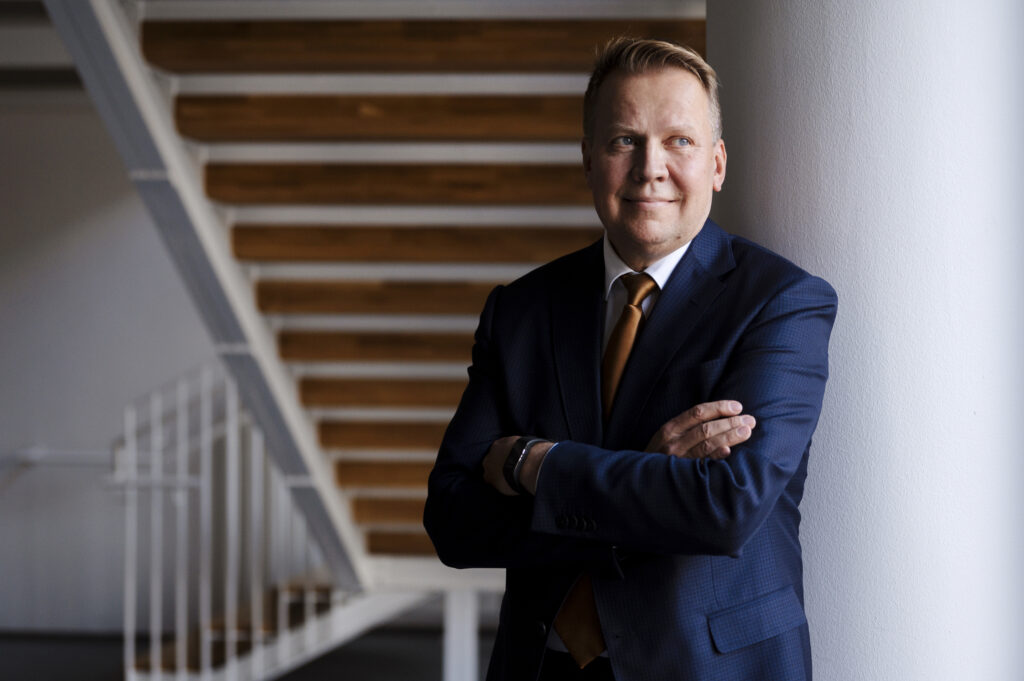YRITTÄJÄ, tule mukaan omiesi pariin! Liity Yrittäjiin.
Thinking Bigger Through Mentorship: From A Business Idea to A Scalable Business
Of the 591,518 Finnish businesses in 2021, only 9,376 (that’s just 1.5%) grew beyond 20 employees, and only 609 businesses scaled to the point that they employed more than 200 people. A whopping 73% of Finnish businesses don’t employ anyone other than the founder. These figures are skewed towards women, with fewer female entrepreneurs scaling and/or exiting their businesses.
With these numbers, it is a fact that Finland is a country of small businesses. But it also raises the question, why do so many entrepreneurs not scale their businesses? What does it take for a business to not just survive but thrive and scale?
According to LinkedIn, “Scalability is the ability of a business idea to grow and generate more revenue without increasing the costs and resources proportionally.” When it comes to scaling businesses, female entrepreneurs face a unique set of challenges. Many women start businesses because of the flexibility and autonomy that self-employment offers. While some may have aspirations for growth, others are content with simply using their skills or ideas to earn a living on their own terms. Very few women choose to start a business with the end goal of scaling and /or exiting a business.
Why Don’t More Female Entrepreneurs Scale Their Businesses
Despite the potential for success, many female entrepreneurs still struggle to scale their businesses. According to Startups Magazine, there are four main reasons behind this:
Lack of Confidence
One of the primary obstacles faced by female entrepreneurs in scaling their businesses is a lack of confidence. Despite possessing the requisite skills and expertise, many women hesitate to pursue ambitious growth plans due to self-doubt. This lack of confidence can stem from various factors, including societal expectations, imposter syndrome, and a perceived lack of validation in male-dominated industries. Consequently, female entrepreneurs may downplay their achievements and hesitate to take calculated risks essential for scaling their businesses.
Lack of Knowledge
Another significant challenge confronting female entrepreneurs is the lack of formal business education and knowledge gaps in scaling strategies. While Finland offers support systems and resources for entrepreneurs, including incubators, accelerators, and government initiatives, access to comprehensive business education remains limited for many women. As a result, female entrepreneurs may lack the necessary skills and expertise to navigate the complexities of scaling, from financial management and strategic planning to marketing and sales.
Perfectionism and Overemphasis on Details
Perfectionism, often viewed as a positive trait, can paradoxically hinder female entrepreneurs’ ability to scale their businesses. Women may become excessively focused on minor details and micromanagement, diverting attention from overarching strategic goals. This inclination towards perfectionism can manifest in various aspects of business operations, from product development and customer service to branding and marketing. While attention to detail is essential for maintaining quality standards, an overemphasis on perfectionism can impede progress and hinder scalability.
Need for Support and Accountability
In addition to confidence and knowledge gaps, female entrepreneurs in Finland often lack adequate support and accountability structures to facilitate scaling. Many women operate as solopreneurs or in small teams, limiting their capacity to delegate responsibilities and seek external guidance. Without a robust support network comprising mentors, advisors, and peers, female entrepreneurs may struggle to overcome challenges and sustain momentum in scaling their ventures.
Turning A Business Idea into A Scalable Business as an International Female Entrepreneur
Ana Alfelor-Mäkelä, originally from the Philippines, has been living in Finland for six years and started her business called “Sachi Living”. As a medical interior designer, she started Sachi Living with a mission to improve the well-being of professionals in Finland between 25 to 45 years old through living space design.
“I design medical spaces to help people heal. These are all forms of spaces like med spas, clinics, plastic surgery, dental, and different kinds of practices. Sachi Living was born from my personal experience of going through burnout. When I was going through that, I felt very overwhelmed. To get myself out of it, I thought, ‘Why don’t I apply the same things that I do in my career to my personal life and in my home?’ So, what I did was create a system that focuses on how to be more intentional about what you surround yourself with so you can improve your well-being,” Ana explained, reflecting on her motivations to start her business idea.

However, despite having a business idea, Ana had no idea on how to start a business. When she joined the She’s Got This mentorship program, her goal was to get guidance on how to jump-start her business idea from ideation to execution.
“I had the idea, but I didn’t know how to start,” Ana recalls. “I lacked the knowledge and experience to turn my vision into a tangible business. That’s where mentorship came in. Having a mentor like Harri Jaskari provided me with insights, ideas, and guidance on how to turn my idea into a program.”
Ana emphasizes the role of mentorship in shaping her entrepreneurial journey. “Through the mentorship program, I gained clarity on my business model, identified potential challenges, and devised strategies to overcome them. Harri’s expertise and mentorship gave me the motivation and encouragement to not only refine my business idea but also to think bigger. He also gave me some ideas on how to turn it into a scalable business.”
The Importance of Mentorship in Fostering Confidence, Knowledge, and Strategic Thinking
Harri Jaskari, a seasoned entrepreneur and mentor in the She’s Got This program, emphasized the significance of mentorship in nurturing confidence, knowledge, and strategic thinking among aspiring entrepreneurs.
He believes that mentorship plays an important role in boosting confidence, especially for international female entrepreneurs who face unique challenges in the Finnish business landscape. “The business culture differs in countries. Through this mentorship, I teach her how everything works in Finnish society and our business culture,” Harri explains. “As a mentor, my role is to give her ideas from what I know and connections with people I know.”

Drawing from his experience as an entrepreneur, Harri also emphasized the importance of testing a business idea before starting a business. “Ana asked me between meetings, ‘Should I form a limited company or keep testing?’ I advised against getting stuck in administrative tasks. Instead, focus on testing your idea and finding customers. Once you’ve gathered enough feedback, then consider formalizing your business.”
Furthermore, Harri shares his approach to helping mentees think bigger and push the boundaries of what they think is possible. “My approach for Ana has been to encourage thinking beyond small-scale initiatives. While starting small is commendable, it’s essential to explore collaborations and trust in others’ expertise,” Harri explains.
He also talks about the cultural differences between Finnish and other cultures, pointing out that Finns prefer practicality and rely on numbers. This understanding led him to suggest that Ana contact the AI ringmaker, knowing Finns trust data-driven solutions. “I urged Ana to reach out to innovative companies developing AI rings because data-driven solutions resonate with Finns and give credibility to novel ideas,” Harri shares.
Finally, he encouraged Ana to consider teaming up with businesses that offer complementary services to what she offers. By collaborating with complementary ventures, Ana could improve her business proposal and reach more customers. This advice aimed to widen Ana’s view, helping her see herself as part of a bigger picture, rather than focusing only on individual customers. This change in perspective empowered Ana to explore new possibilities and form strategic partnerships for her business.

Advice for Aspiring Entrepreneurs Seeking to Scale their Businesses
When it comes to scaling a business, Harri and Ana’s experiences in the mentorship program offer insights and advices:
- Think Big, Start Small: Harri emphasizes the importance of adopting a step-by-step approach to scaling a business. Instead of getting caught up in administrative tasks early on, focus on testing your idea and acquiring customers. Ana’s journey with Sachi Living shows this approach, as she initially started with small-scale trials before envisioning broader applications for her business concept.
- Embrace Flexibility and Adaptability: Ana highlights the significance of maintaining flexibility and adaptability throughout the entrepreneurial journey. In her case, being open to exploring different markets beyond Finland enabled her to overcome language barriers and expand her business horizons.
- Seek Guidance and Mentorship: Harri and Ana both emphasize how important it is to have a mentor when starting a business. As a mentor, Harri provided guidance, encouragement, and alternative perspectives to aspiring entrepreneurs like Ana. For Ana, having a mentor like Harri boosts her confidence and helps her see new possibilities in her business journey.
- Collaborate and Innovate: Harri advises entrepreneurs to team up with forward-thinking companies and think outside the box. By joining forces and connecting with different groups, entrepreneurs can reach new customers, gain more support, and discover fresh ideas that help their businesses grow.
Scaling a business requires a combination of vision, resilience, and strategic thinking. By adopting a step-by-step approach, remaining adaptable, seeking mentorship, and embracing collaboration and innovation, aspiring entrepreneurs in Finland can navigate the challenges of scaling with confidence towards sustainable growth.
Written by Laila Fe Balinggan